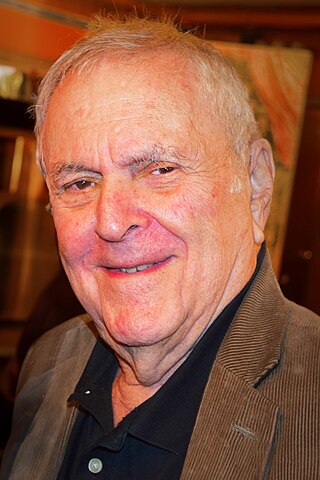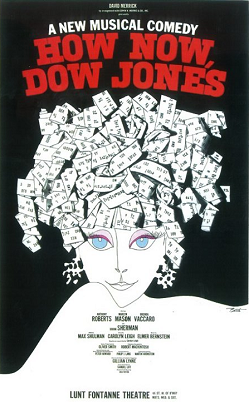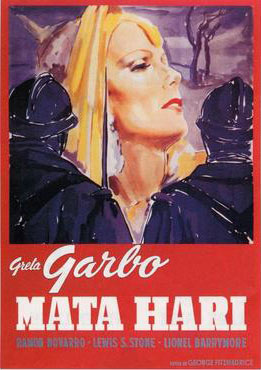
Margaretha Geertruida MacLeod, better known by the stage name Mata Hari, was a Dutch exotic dancer and courtesan who was convicted of being a spy for Germany during World War I. She was executed by firing squad in France. The idea of a beautiful exotic dancer using her powers of seduction as a spy made her name synonymous with the femme fatale. Her story has served as an inspiration for many books, films, and other works.

Liza May Minnelli is an American actress, singer, dancer, and choreographer. Known for her commanding stage presence and powerful alto singing voice, Minnelli is one of the very few performers awarded a non-competitive Emmy, Grammy, Oscar, and Tony (EGOT). Minnelli is a Knight of the French Legion of Honour.

John Harold Kander is an American composer, known largely for his work in the musical theater. As part of the songwriting team Kander and Ebb, Kander wrote the scores for 15 musicals, including Cabaret (1966) and Chicago (1975), both of which were later adapted into acclaimed films. He and Ebb also wrote the standard "New York, New York".

Marisa Mell was an Austrian actress. Typecast as a femme fatale in European arthouse and genre films, she is best regarded for her performances as Eva Kant in Mario Bava's critically re-assessed Danger: Diabolik (1968), and the dual role of Susan Dumurrier/Monica Weston in Lucio Fulci's gialloOne on Top of the Other (1969).
Martin Charnin was an American lyricist, writer, and theatre director. Charnin's best-known work is as conceiver, director, and lyricist of the musical Annie.

Carnival is a musical, originally produced by David Merrick on Broadway in 1961, with the book by Michael Stewart and music and lyrics by Bob Merrill. The musical is based on the 1953 film Lili, which again was based on the short story and treatment titled "The Seven Souls of Clement O'Reilly" by Paul Gallico. The show's title originally used an exclamation point ; it was eventually dropped during the show's run, as director Gower Champion felt it gave the wrong impression, saying, "It's not a blockbuster. It's a gentle show."

Two By Two is a Broadway musical with a book by Peter Stone, lyrics by Martin Charnin, and music by Richard Rodgers.

How Now, Dow Jones is a musical comedy by Academy Award winner Elmer Bernstein, Tony Award nominee Carolyn Leigh and Max Shulman. The original Broadway production opened in December 1967. A critically acclaimed revised version premiered Off-Broadway in August 2009.

Mata Hari is a 1931 American pre-Code drama film directed by George Fitzmaurice loosely based on the life of Mata Hari, an exotic dancer and courtesan executed for espionage during World War I. The Metro-Goldwyn-Mayer film stars Greta Garbo in the title role. It was Garbo's most commercially successful vehicle. Only a censored version of the film is currently available.

Breakfast at Tiffany's is a musical with music and lyrics by Bob Merrill and a book originally by Abe Burrows but rewritten during pre-Broadway tryouts by Edward Albee. It is based on the 1958 Truman Capote novella and 1961 film of the same name about a free spirit named Holly Golightly.

La Strada is a musical with lyrics and music by Lionel Bart, with additional lyrics by Martin Charnin and additional music by Elliot Lawrence. It is based on the 1954 film of the same name by Federico Fellini. Bart wrote the score in 1967 and made a demonstration recording, although the musical was not produced until 1969, when it was famously cancelled after just one performance. The musical's book was written by Charles K. Peck, Jr., who also produced it on Broadway.

George M! is a Broadway musical based on the life of George M. Cohan, the biggest Broadway star of his day who was known as "The Man Who Owned Broadway." The book for the musical was written by Michael Stewart, John Pascal, and Francine Pascal. Music and lyrics were by George M. Cohan himself, with revisions for the musical by Cohan's daughter, Mary Cohan.

The Happy Time is a musical with music by John Kander, lyrics by Fred Ebb, and a book by N. Richard Nash loosely based on a 1950 hit Broadway play, The Happy Time by Samuel A. Taylor, which was in turn based on stories by Robert Fontaine. The story had also been made into a 1952 film version.

Mata Hari is a 1985 erotic biographical film directed by Curtis Harrington, produced by Golan-Globus and featuring Sylvia Kristel in the title role of exotic dancer Mata Hari, executed for espionage during World War I.
Mata Hari (1876–1917) was a Dutch exotic dancer executed for espionage during World War I.

The Season: A Candid Look at Broadway is an account of the 1967–1968 season on and off-Broadway by American novelist and screenwriter William Goldman. It originally was published in 1969 and is considered one of the better books ever written on American theater. In The New York Times, Christopher Lehmann-Haupt called the book “Very nearly perfect...It is a loose-limbed, gossipy, insider, savvy, nuts-and-bolts report on the annual search for the winning numbers that is now big-time American commercial theatre.”
Shelly Burch is an American actress and singer known to television audiences for her role as Delilah Ralston on ABC's daytime soap opera One Life to Live, a role she played for eight years.

Mata Hari, Agent H21 is a 1964 French-Italian spy film directed by Jean-Louis Richard and starring Jeanne Moreau, Jean-Louis Trintignant and Claude Rich. It portrays the activities of the First World War spy Mata Hari. Costumes by Pierre Cardin.
Mata Hari at the Moulin Rouge is a musical with a book by Ivan Menchell, lyrics by Jack Murphy, and music by Frank Wildhorn. It is based on the life of Mata Hari, a dancer and spy during World War I.

Jerome Coopersmith was an American dramatist known for television, theater, and his work as a professor of screenplay writing. Working in the television industry since 1947, Coopersmith authored more than 100 television scripts for anthology dramas, episodic series and television movies and specials. His television work included Johnny Jupiter (1953-1954), Armstrong Circle Theater (1955–1963), Hawaii Five-O (1967–1976), and Streets of San Francisco (1973), and the holiday classics 'Twas the Night Before Christmas (1974) and An American Christmas Carol (1979). Coopersmith's theatrical plays span Broadway, off-Broadway, and regional productions. His Broadway musical, Baker Street (1965), based on the stories of Sherlock Holmes, earned him a Tony Nomination as Author of Best Musical. He was a member of the Dramatists Guild, the Mystery Writers of America, and was a member and past officer of the Writers Guild of America, East. On November 12, 2019, at age 94, Coopersmith was honored with the highest distinction of Chevalier, or Knight, in the National Order of the French Legion of Honor in recognition of his service to France in World War II.















